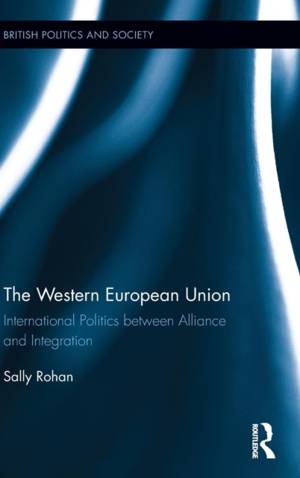
- Retrait gratuit dans votre magasin Club
- 7.000.000 titres dans notre catalogue
- Payer en toute sécurité
- Toujours un magasin près de chez vous
- Retrait gratuit dans votre magasin Club
- 7.000.0000 titres dans notre catalogue
- Payer en toute sécurité
- Toujours un magasin près de chez vous
Description
This full-term study of the Western European Union (WEU) brings to life the history of Europe's search for a co-operative security and defence order, from its post World War II origins to the present day. Establishing the WEU as a support organization, designed to promote the two security "ideas" of collective defence and integration through the primary organizations of Alliance and Community, this book offers a window onto the challenges faced in the development and management of NATO and the evolving EC/EU over time. As the WEU's historical journey unfolds, the frequently competing visions of the future organization of the European security space are exposed in the fluctuating nature of its own functional evolution and devolution. A hybrid organization driven by its dual support role, the constructively ambiguous and conveniently autonomous WEU was to provide a mechanism through which divergent interests could converge and inherent tensions be relieved, preventing NATO and EC/EU stagnation. This book offers fresh insight into the means by which the gradual transformation of the institutional framework of European security was enabled, and stakes the WEU's claim as a fundamental and life-long contributor to the stability of the European security system.
Spécifications
Parties prenantes
- Auteur(s) :
- Editeur:
Contenu
- Nombre de pages :
- 408
- Langue:
- Anglais
- Collection :
Caractéristiques
- EAN:
- 9780714656137
- Date de parution :
- 04-08-14
- Format:
- Livre relié
- Format numérique:
- Genaaid
- Dimensions :
- 157 mm x 231 mm
- Poids :
- 725 g

Les avis
Nous publions uniquement les avis qui respectent les conditions requises. Consultez nos conditions pour les avis.






